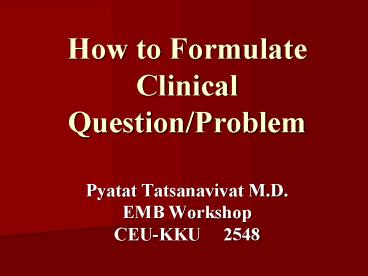How to Formulate Clinical QuestionProblem - PowerPoint PPT Presentation
1 / 24
Title:
How to Formulate Clinical QuestionProblem
Description:
When a patient problem is bothering you. or ... intravenous therapy) Counsell C. Ann Intern Med. 1997;127:380-7. Risk factor. Prognostic factor ... – PowerPoint PPT presentation
Number of Views:87
Avg rating:3.0/5.0
Title: How to Formulate Clinical QuestionProblem
1
How to Formulate Clinical Question/Problem
- Pyatat Tatsanavivat M.D.
- EMB Workshop
- CEU-KKU 2548
2
Clinical Decision Making
Patient circumstances
Preferences, values and rights
Evidence from research
3
WHEN TO SEARCH FOR EVIDENCE
- When a patient problem is bothering you
- or
- when a patient presents with a comman problem you
will encounter often
4
EBM Skills
- Formulate a clinically relevant and searchable
question - Find the evidence
- Evaluate the evidence
- Validity
- Importance of results
- Apply to your patient
- USE COMMON SENSE
5
Where Do Questions Come From?
- Patients
- Diagnosis
- Etiology
- Prognosis
- Treatment/prevention
- Practice variations-which is best?
- New treatment or diagnosis
Counsell C. Ann Intern Med. 1997127380-7
6
Importance of a Question
- Depends on area of expertise
- Effects on patients
- severity-morbidity/mortality/QoL
- Duration
- Financial cost
- Effects on society
- Prevalence/severity
- Financial cost
- Feasibility of assessment
- Ability to change practice
Counsell C. Ann Intern Med. 1997127380-7
7
Formulating the Question
- Basic components
- Type of person
- Type of exposure
- Type of control
- Outcome of interest
- Type of study design
Counsell C. Ann Intern Med. 1997127380-7
8
Type of Person
- Disease or condition
- Definition
- Cause
- Stage
- Severity
- Personal characteristics
- Age
- Sex
- Symptoms
- Population or setting
- Community
- Hospital (outpatient or inpatient)
Counsell C. Ann Intern Med. 1997127380-7
9
Type of Exposure
Definition Intensity or dose Timing
Duration Method of delivery group therapy
individual therapy oral therapy or
intravenous therapy)
- Risk factor
- Prognostic factor
- Intervention
- Diagnosis
Counsell C. Ann Intern Med. 1997127380-7
10
Type of Control Absence of risk or prognostic
factor (risk and prognostic reviews) Gold
standard test (diagnostic reviews) Treatment
controls (treatment and prevention
reviews) Active treatment or no treatment
Placebo control or open control
Counsell C. Ann Intern Med. 1997127380-7
11
Type of Outcome
Importance to patient Clinically relevant or
surrogate Death, quality of life, disability,
and symptoms or signs Beneficial and harmful
effects of interventions Use of health care
resources (economic evaluations) Definitions Timin
g of outcome assessment
Counsell C. Ann Intern Med. 1997127380-7
12
Type of Study Design
- Experimental or observational
- Randomized or nonrandomized controlled trails
- Blinded or open trials
- Confounded or unconfounded studies (that is a
comparison of treatment A versus no treatment is
confounded by treatment B, whereas trial of A
and B versus B alone is not confounded
Counsell C. Ann Intern Med. 1997127380-7
13
THE FOCUSED CLINICAL QUESTION
- P Relevant patients
- I Interventions or risk factors
- C Comparisons
- O Outcomes of interest (benefits, harm, costs)
- Ex is eye patching improve the healing rate of
traumatic corneal epithelial defects?
14
Should a echinacea preparation used for common
cold?
Subjects with common cold
- Patient
- Intervention
- Outcome
Echinacea preparation
Total daily symptom scores TDSS
15
Medical Students Questions
- What are the symptoms of common cold?
- How does echincea work?
- What is the etiology of common cold?
- What is the incidence of common cold?
16
Background Questions
- Ask for general knowledge about a disorder
- Have two essential components
- A question root (who, what, where, when, how,
why) with a verb - A disorder, or an aspect of a disorder
17
Practitioners Questions
- In this patient are any clinical findings
sufficiently powerful to diagnose common cold? - Should common cold be treated with drug or
biological extract? - What are the potential harmful effects of common
cold? - In these patient , what are the predictors
indicating echinacea will be beneficial - What is the compliance of echinacea treamtent?
18
- Notice that these questions ask for specific
knowledge about how to diagnose, prognose, and
treat the patients with common cold, which might
be called foreground knowledge. - Ask for specific knowledge about managing
patients with a disorder
19
Foreground Questions
- Have four (or three) essential components
- The patient and/or problem of interest
- The main intervention (defined very broadly,
including an exposure, a diagnostic test, a
prognostic factor, a treatment, a patient
perception, and so forth) - Comparison intervention(s), if relevant
- The clinical outcome(s) of interest.
20
Background and foreground questions
C
A - less C - experienced
21
- Clinical practice demands large amounts of both
background and foreground knowledge.
22
Background vs Foreground Questions
- Background
- What is?
- Use Textbooks for these
- Foreground
- Specific Clinical Issues
- More Sophisticated Resources
23
Sources of Relevant Studies
- Electronic databases
- Manual search journal, proceedings book
- Reference lists
- Existing study registries
- Current-awareness publications
- Pharmaceutical and appliance companies
- Personal contact with colleagues researchers
Counsell C. Ann Intern Med. 1997127380-7
24
Key Points to Remember
- Choose important well-focused question
- Refine the four major components
- Set clear, workable inclusion criteria
- Take time to plan a sensible and thorough search
strategy - Use multiple overlapping sources of data
- Ensure that clinical and methodological expertise
and support are available
Counsell C. Ann Intern Med. 1997127380-7































